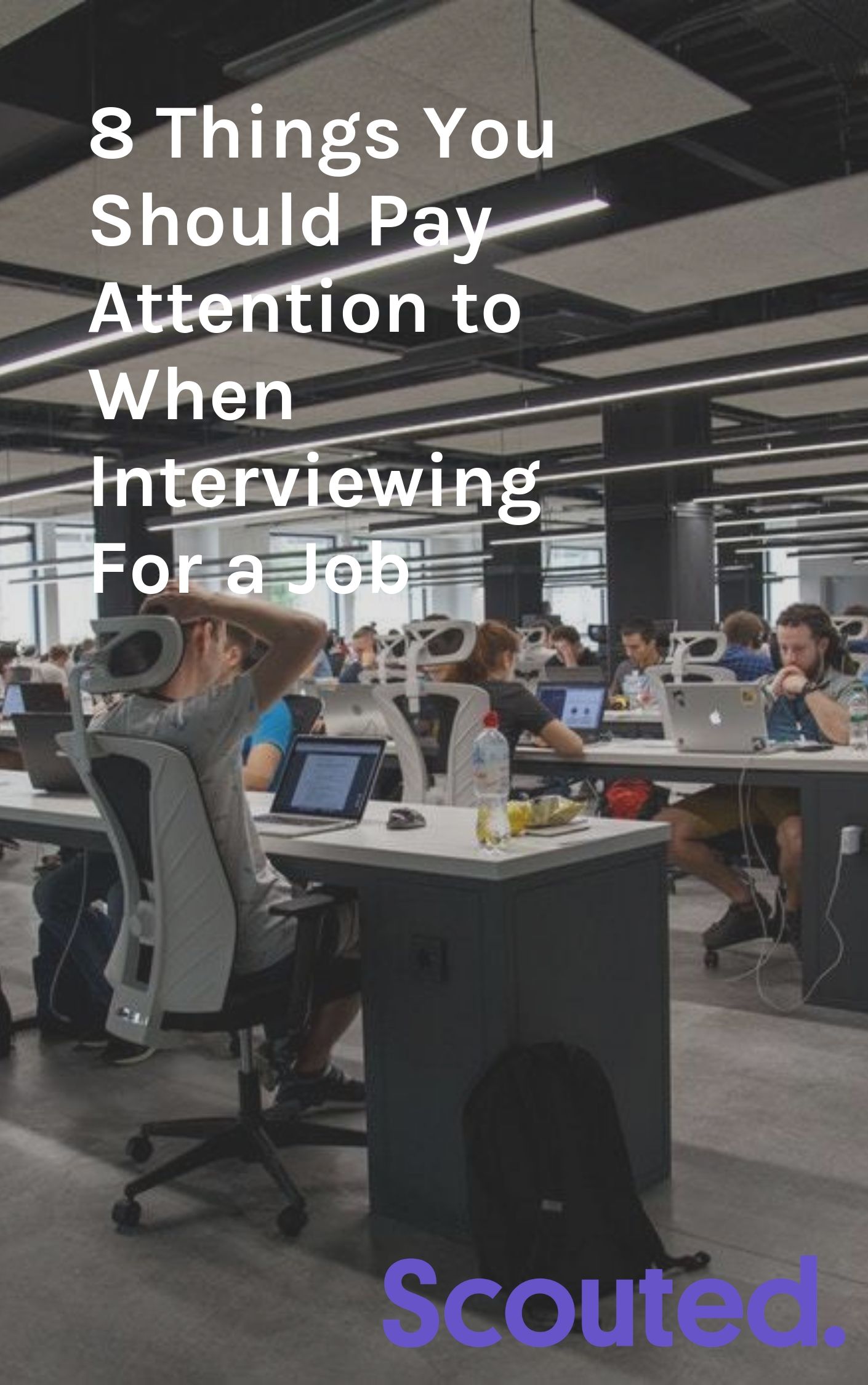Here at Scouted, we talk with a lot of candidates and help them with interview prep to help them feel ready for the big day. One of the things we always remind our candidates is that in a job interview, they’re not the only one being interviewed. That’s right. Not all the pressure is on you! Of course, you’ll want to put your best foot forward and do your best to convince the hiring manager that you’re perfect for the role, but interviews are a two-way conversation that should help YOU understand if the company is a good fit for you and if you would enjoy working there. Besides asking questions about the office you might work in someday (which you should do) we made a list of some other things to be aware of. Read the post below and keep your eyes open for some telling office “body language” that may tell you if it’s the place for you or not.
Also on Mediabistro


Check out the other employees, without being creepy
How do the other employees interact with you? Or more importantly, how do they interact with each other? If you can, try to pay attention to how employees talk to each other. Do they seem to be friendly with each other or mostly concerned with business as usual? Does it seem like they’re kind to each other? Happy? Just watch for yourself while you’re waiting for your interview to begin and picture yourself as an employee going about your day for the company. If the employees you see look happy doing their jobs, there’s a good chance you might be, too.
How do they answer the phone?
This article from Forbes suggests paying attention to how employees answer the phone at the company where you’ll interviewing. Chances are you’ll be seated next to a front desk for at least a few minutes before your interview (all the more reason to be fashionably early), and you’ll get the chace to eavesdrop for a moment. Play attention to how an employee sounds when they answer the phone. Do they sound happy and genuine when talking with the person on the other line or do they sound as if they’re reading off a script? The way an organization coaches its employees to handle phone calls can say a lot about the office culture. If an employee is engaged, energetic, and able to show his or her own personality, it may be a sign that the employee enjoys their job and the office encourages a fun, customer-focused workplace. If the person answering the phone sounds like they’ve said the very same thing 100 times that day, the office environment may be restricting.
What is the pace of the office?
When you walk into the office or through it to where you’ll be interviewing, how does the pace of the office feel? Many people enjoy working in a fast paced environment so seeing employees fast at work shouldn’t necessarily be a deterrent to working in an office. However, if employees seem frazzled, rushed, or stressed, it may be a red flag that the office is understaffed or an overall stressful work environment. Also, pay attention to how quickly you’re able to be taken back to meet your interviewer compared to the time of your scheduled interview and how present they seem during your interview. Things happen and sometimes interviewers get delayed, but if their rushed demeanor seems to match the rest of the office environment, it may be something to take note of.
The physical office environment
In a study done by Blue Kite Marketing, they “found that 53% of companies said their physical space – including design, decor and layout – reflects their brand.” If the office where you’re interviewing looks like it hasn’t been updated since jelly shoes were cool, it might be a safe bet that technology isn’t a huge priority. An open or closed environment might speak to how the company or its teams work together as a whole. Try to picture how it would feel to work in that office day by day. Does it feel welcoming? Elite? Technology-driven? Closed off? Outdated? In any case, just be sure the office environment feel like a place where you can work your best.
[sc name=“Newsletter”]
The dress code
You probably wondered (or worried) about this before you even showed up for your interview. Many offices have different dress codes that often coincide with the industry’s culture. A startup will probably have a more relaxed office dress code whereas a finance office will be clad in dark suits. While a dress code probably shouldn’t make or break your decision to work for a particular office, just be sure it’s something you’re able to sustain for the long run. And hopefully you won’t have to do an entire wardrobe overhaul.
The supervisor/employee relationship
You probably realize that you’re being interviewed for this position for a reason. Either the company felt the need to create a new position/expand the department or the person in the position before you left. If your interviewer references the person who previously had the role you’re applying for, pay attention to how they talk about their former employee. Do they choose to gossip or make derogatory comments? How friendly and personable is the supervisor with the employees they’re currently working with? How do other employees address the supervisor and act around him or her? If having approachable leadership is something that’s important to you, it might be something to take note of.
Do your values/ethics line up with the company?
Before your interview, you might want to look up any background information you can find on the company’s mission, vision, history, and office culture. Then, beyond that, pay attention to what your interviewer chooses to talk about or joke about in small talk. This may be hard to determine from just one meeting, but do your best to pay attention to any work or office culture that may clash with values of your own and if it might be a deal breaker.
Is your role clearly defined?
Depending on the industry you’re going into and the individual office culture, the same job title could look different from company to company. While every company has different needs, you might want to get an understanding of just how many hats you’ll be wearing at your new company. Older, established companies might have a more defined role with clearly stated expectations whereas startups may be trusting you to be the very first in your position and may even ask you to wear a couple of other hats while the company is still growing. Simply asking your interviewer what a day in your role might look like could be a great way to answer this question. Can they easily tell you what you’ll be doing on a regular basis or is it difficult to get a straight answer? If so, just be sure you’re flexible and love multitasking.
What are your best tips for treating an interview like a two-way street? Favorite questions to ask an interviewer? Leave yours in the comments below and share with the person you’ll be watching the Oscars with.





